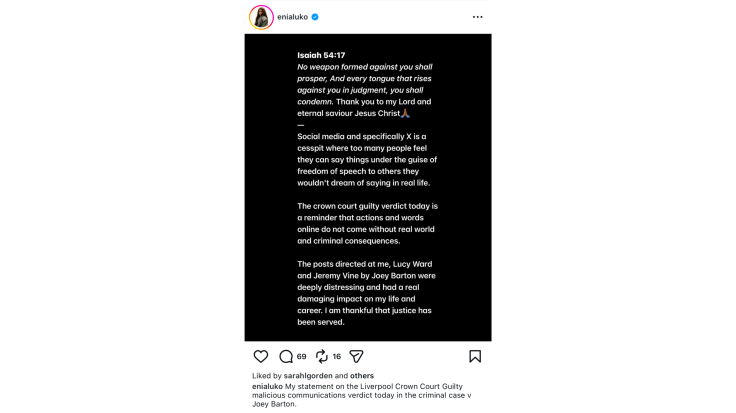Joey Barton Guilty: Court Rules The Ex-Footballer's Online Persona 'Crossed The Line'
Ex-Footballer Found Guilty Of 'Grossly Offensive' Posts Targeting Broadcaster And Pundits

Former footballer Joey Barton has been found guilty of six counts of sending 'grossly offensive' messages on social media, after a UK court ruled that his online persona had 'crossed the line' between free speech and criminal abuse.
A jury at Liverpool Crown Court concluded that Barton, 43, used his X (Formerly Twitter) account, with a following of more than 2.7 million users, to post a series of targeted messages between January and March 2024 aimed at broadcaster Jeremy Vine and football pundits Eni Aluko and Lucy Ward.
The case marks one of the most high-profile prosecutions under UK communications laws in recent years, raising questions about whether public figures should be held to a higher standard when posting to millions online.
Posts Compared Female Pundits To Serial Killers
Prosecutors said Barton compared Aluko and Ward to notorious serial killers Fred and Rose West, and superimposed their faces onto a photograph of the couple. He also accused Aluko of being 'only there to tick boxes', dismissing diversity initiatives as 'BLM/George Floyd nonsense'.
In additional posts, Barton called Vine a 'bike nonce' and suggested the radio presenter had links to convicted sex offender Jeffrey Epstein. One post read: 'If you see this fella by a primary school call 999.'
Jurors heard how Vine told the court he felt 'physically unsafe' after the online attacks and had to seek security advice.
Aluko and Ward also described the comments as deeply distressing, saying they reflected a wider culture of online misogyny targeting women in football.
Barton was convicted of six counts of sending a grossly offensive electronic communication with intent to cause distress or anxiety.
He was cleared of six other counts.
Judge Warns Humour Cannot Excuse Degrading Content
Judge Andrew Menary KC reminded the court that the term 'grossly offensive' sets a high threshold for conviction.
'The criminal law is not there to punish bad manners or unpopular opinions,' he said. 'It only intervenes when content is of such a degrading or dehumanising character that society as a whole says that goes too far.'
The judge also told Barton it would be 'very foolish' to comment publicly about the case ahead of sentencing, after the former player appeared in court wearing a Union Jack scarf, described by the judge as a 'stunt'.
Barton insisted his remarks were 'dark and stupid humour' and described the proceedings as a 'political prosecution'.
He told jurors he was 'trying to make a serious point in a provocative way' but denied intending harm.
Prosecution Says Barton Intended To Cause Distress
Prosecutor Peter Wright KC told the court Barton had gone 'beyond any reasonable definition of humour or satire', calling him 'a little bully who takes pleasure posting slurs'.
Senior Crown Prosecutor Callum Bryce said the verdict confirmed that Barton's conduct 'had gone beyond any joke' and that his posts were 'grossly offensive with the purpose of causing anxiety and distress'.
Eni Aluko Welcomes Verdict
Following the ruling, pundit and former England striker Eni Aluko said she hoped the case would serve as a reminder that online behaviour carries real-world consequences.
'Social media is a cesspit where too many people feel they can say things to others they wouldn't dream of saying in real life under the guise of freedom of speech. This is a reminder that actions online do not come without consequences,' Aluko posted on Instagram.

She added that the comments directed at her, Ward and Vine had been 'deeply distressing' and had a 'damaging impact' on her life and career.
Sentencing Set For December As Free Speech Debate Reignites
Barton, who previously managed Fleetwood Town and Bristol Rovers, was released on bail and is due to be sentenced on 8 December. His bail conditions prohibit him from mentioning Aluko, Ward or Vine online before sentencing.
The ruling has reignited debate over the limits of free speech and accountability in sport, underscoring how an online persona can 'cross the line' into criminal behaviour under UK law.
Public Reaction Divided Online
The verdict has also divided opinion across social platforms.
On X (Formerly Twitter), several users expressed concern that the case could blur the boundaries between offensive speech and criminality.
🚨Shocking State of Free Speech in the UK Exposed as Joey Barton Convicted in Court for Social Media Jibes!
— J Stewart (@triffic_stuff_) November 7, 2025
Joey Barton has been found guilty of six counts of sending grossly offensive electronic communications on X. He compared female pundits Lucy Ward and Eni Aluko to serial... pic.twitter.com/eLBBxKLqU8
They have now set a precedent.
— UK bloke🇬🇧 (@3doorhandles) November 7, 2025
Expect much more of this.
Others, however, defended the ruling, arguing that Barton's posts went far beyond banter.
Everybody has the right to free speech, however that also comes with consequences which have to be considered...
— 🟥Caro: N19. #AFC OLE OLE OLE! #COYG (@moto26261) November 7, 2025
Joey Barton has been found guilty of posting grossly offensive messages on X, causing harm and anxiety to his victims.
— BillKen (@BillKen99) November 7, 2025
This is good. They should bring these laws to the USA. pic.twitter.com/WQqPGvQici
Legal commentators have noted that while freedom of expression remains protected under UK law, the Barton case demonstrates how intent and harm can transform 'online banter' into a criminal offence.
© Copyright IBTimes 2025. All rights reserved.




















